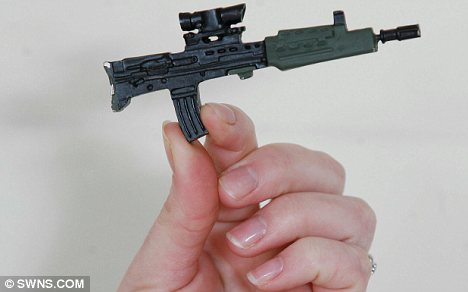It’s as predictable as night following day: for every defence cut, you can find retired senior officers getting up on their hind legs and protesting:
Scrapping the RAF’s Nimrod surveillance aircraft will leave a “massive gap” in British security, former defence chiefs warned today.
The controversial decision to get rid of the £4bn fleet was taken on cost grounds as part of the government’s strategic defence and security review last year.
With the process of breaking up the equipment set to begin, a number of service chiefs signed an open letter to the Daily Telegraph warning of the dangers of the move.
“Machine tools have been destroyed; several millions of pounds have been saved but a massive gap in British security has opened,” the letter said.
“Vulnerability of sea lanes, unpredictable overseas crises and traditional surface and submarine opposition will continue to demand versatile responsive aircraft.
There was a number in there that helps to explain the cuts: £4bn. That’s a lot of money. What did the RAF get for their money? In a column from 2009, here’s Lewis Page on the manifold wonders of the Nimrod:
Quite apart from all that, the Nimrod MR2 — being a flying antique — is horribly expensive to run, both in money and in lives. The MR2’s extensive use above Afghanistan in recent times as a flying spyeye and to relay radio messages between ground units in no way justified its continued, very expensive existence; far less could such unimportant work possibly have justified the known risks of refuelling these aged birds in mid-air.
So getting rid of the MR2s loses us nothing important, and will make our service people noticeably safer — the Nimrod has actually killed one of our people for every 15 killed by the Taliban. Better still, this will permit another pricey airbase here in the UK to largely close, saving money to be spent at the front line. As a fringe benefit, the base in question — RAF Kinloss — is in a Scottish National Party constituency, giving people there a taste of the independence from the UK that they have voted for. (Strangely the local SNP member of parliament still isn’t happy.)
So the Nimrod was expensive to buy, eye-wateringly expensive to upgrade, but it must be cheap to operate, right? No:
[. . .] our new fleet of refurbished De Havilland Comet subhunters (sorry, “Nimrod MRA4s”) will cost at least £700m a year to operate. If we put the whole Nimrod force on the scrapheap for which they are so long overdue right now, by the year 2019 we will have saved [. . .] £7bn
That’s from an earlier column in 2009.
Update: Lewis Page says that scrapping the four Nimrods is great news:
 The UK press is bursting with indignation today as the process of scrapping the Nimrod MRA4 submarine-hunting aircraft begins. But in fact the four planes now being broken up were a financial and engineering disaster. Had they gone into service they would have become a terrible, cripplingly expensive millstone around the neck of the Ministry of Defence. We are much, much better off without them.
The UK press is bursting with indignation today as the process of scrapping the Nimrod MRA4 submarine-hunting aircraft begins. But in fact the four planes now being broken up were a financial and engineering disaster. Had they gone into service they would have become a terrible, cripplingly expensive millstone around the neck of the Ministry of Defence. We are much, much better off without them.
[. . .]
What the ex-brasshats are bemoaning is the UK’s loss of long-range maritime patrol aircraft in general, not the Nimrod MRA4 in particular. They’re wise to draw this distinction, as the MRA4 project has now achieved the unwelcome distinction of producing the most expensive aircraft ever made: with a reported £4.1bn spent, just one is airworthy.
By comparison, a new Space Shuttle would cost about £1.75bn at current rates if it were built today. Even the staggeringly expensive B-2 nuclear Stealth bombers only cost £1.3bn apiece.
Our sole flying Nimrod MRA4 (pictured above) has wound up costing us no less than £4.1bn — and it is not even a new aircraft. All the MRA4s are refurbished and re-equipped Nimrod MR2s, which had already been purchased by the RAF long ago at inflated prices.
But wait . . . it gets even worse:
And make no mistake, scrapping the Nimrods will save money — a lot of money. Support and maintenance of a normal military aircraft can be expected to cost two to three times the acquisition price over its service life — and the Nimrod was far from normal.
In fact, the MRA4s would have been the last nine De Havilland Comet airliner airframes left flying in the world. The Comet, designed in the 1940s, failed commercially and went out of airline service many decades ago — and since then large aircraft have no longer been made in the UK.
The Nimrod/Comet is so old that it belongs to a lost era of manufacturing: this is the main reason why the MRA4 project was so horrifically late and over budget. The planes supplied for upgrading by the RAF had significant differences in size and shape — they had been essentially coach-built, bodged together with the blueprints used more as a guide than followed with any accuracy in the modern sense. Trying to rebuild, re-equip and re-engine them, with no real idea what the physical dimensions and internal layout of any given plane actually were, was a technical nightmare.


 The UK press is bursting with indignation today as the process of scrapping the Nimrod MRA4 submarine-hunting aircraft begins. But in fact the four planes now being broken up were a financial and engineering disaster. Had they gone into service they would have become a terrible, cripplingly expensive millstone around the neck of the Ministry of Defence. We are much, much better off without them.
The UK press is bursting with indignation today as the process of scrapping the Nimrod MRA4 submarine-hunting aircraft begins. But in fact the four planes now being broken up were a financial and engineering disaster. Had they gone into service they would have become a terrible, cripplingly expensive millstone around the neck of the Ministry of Defence. We are much, much better off without them.

